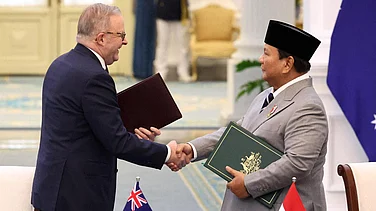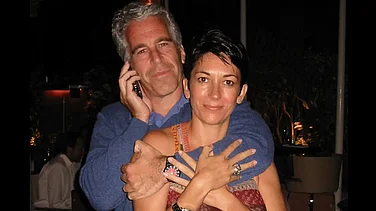Julian Assange, the founder of WikiLeaks, was released from Belmarsh prison in the UK on Monday, local time, following an agreement to plead guilty to a charge of conspiring to disclose classified US national defense documents.
Assange was supposed to plead guilty to a felony charge in a deal with the U.S. Justice Department that would free him from prison.
According to AP, the Justice Department said in a letter filed in court, Assange was scheduled to appear in the federal court in the Mariana Islands, a U.S. commonwealth in the Western Pacific, to plead guilty to an Espionage Act charge of conspiring to unlawfully obtain and disseminate classified national defense information.
The 52-year-old's release marks the conclusion of his five-year detention in the UK, where he contested extradition requests from the United States.
The US government had been pursuing Assange for disclosing military secrets, with the UK approving his extradition in June 2022. Assange is now set to appear in a US court on Wednesday, local time, as part of the legal proceedings against him.
Who Is Julian Assange?
Julian Assange, an Australian editor and publisher, gained worldwide renown as the founder of WikiLeaks, a platform that sparked widespread attention — and controversy — with its 2010 publication of nearly half a million documents concerning US military operations in Iraq and Afghanistan.
Assange's advocacy for transparency and his role in exposing alleged US military misconduct abroad earned him support from press freedom advocates who argued that his actions reflected traditional journalistic duties.
Timeline Of Julian Assange's Case
However, his activism wasn't approved by American prosecutors, who in 2019 released an indictment. This indictment accused Assange, who had sought asylum in the Ecuadorian Embassy in London, of conspiring with a US Army private to unlawfully access and disseminate sensitive government records.
Assange faced accusations from the Trump administration's Justice Department for allegedly directing Chelsea Manning to leak classified US government documents, marking one of the largest breaches of its kind in American history.
The charges stem from WikiLeaks' release of thousands of military and diplomatic files, including classified diplomatic cables and Defense Department records.
Prosecutors claimed Assange aided Manning in stealing these documents, jeopardizing national security. Manning, who received a 35-year sentence for the leaks, had her term commuted by President Obama in 2017.
Assange spent the last five years in a British prison resisting extradition to the US, initially seeking refuge in the Ecuadorian Embassy in London until his eviction in 2019.
Despite legal battles and court rulings, including a UK judge's rejection of his extradition in 2021 citing suicide risks, Assange faced renewed extradition efforts culminating in a UK government order in June 2022.
Recently, two High Court judges granted Assange permission to appeal, focusing on free speech protections and concerns over unequal treatment due to his non-US citizenship.
Amid these legal complexities, Assange, following a plea deal, is set to plead guilty to a felony charge under the Espionage Act. His sentencing, scheduled for Wednesday in Saipan, Mariana Islands, aims to facilitate his return to Australia, with Assange departing British custody on Monday ahead of the pending court decision.


























